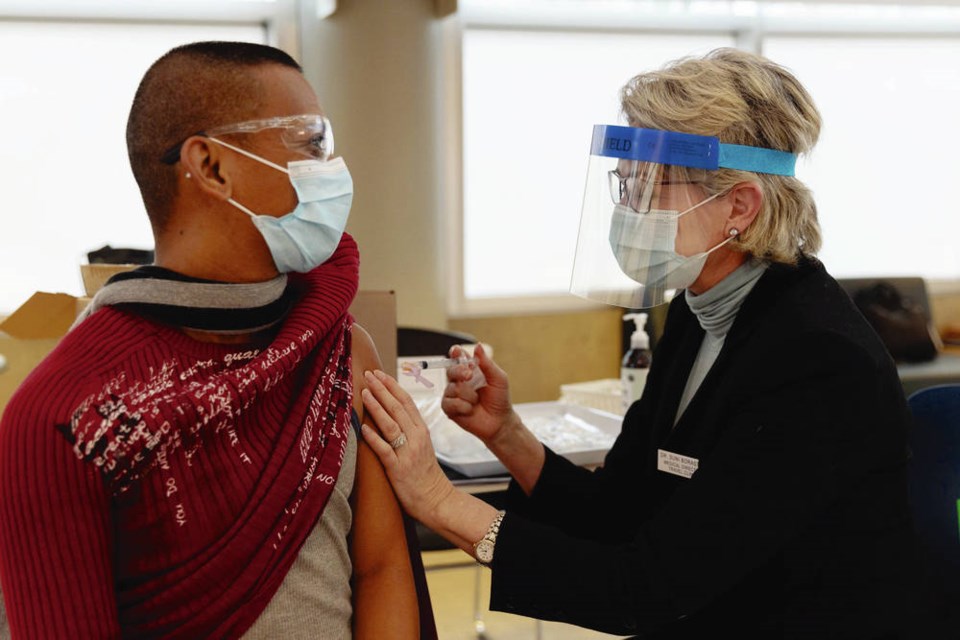It’s probably too soon to consider adding booster shots to B.C.’s COVID-19 immunization program for most residents, although they’re likely a good idea for certain vulnerable individuals, experts say.
France and Germany have plans to roll out third COVID vaccinations for clinically vulnerable and elderly populations starting in September, while the U.S. announced Wednesday that it would offer boosters to all adults as soon as next month. Those programs defy a World Health Organization plea for a moratorium on third-dose efforts, at least until the end of September, until more people in less wealthy countries get access to their first vaccines.
In Canada, provinces such as Quebec and Saskatchewan have begun offering third doses of the Moderna or Pfizer mRNA vaccines for their residents who mixed and matched vaccine doses with Oxford AstraZeneca, which isn’t recognized for travel to certain destinations.
Island Health medical health officer Michael Benusic said there’s no evidence at this time in B.C. and Island Health that boosters are needed now.
“I have not seen concerns that those who were vaccinated earlier are at higher risk of acquiring COVID-19 or having severe effects from COVID-19,” said Benusic.
“I know that other jurisdictions are moving in that direction, but people should have reassurance that what we are seeing is that they are still highly protected. “If that was to change we will move on the science.”
Most new COVID-19 infections in B.C. are in people who are unvaccinated or partially vaccinated.
Vaccine-immunology expert Ralph Pantophlet said for the majority of people in B.C., at least those who have been vaccinated over the summer, it would be premature to be worrying about booster shots. However, Pantophlet, an associate professor in Simon Fraser University’s faculty of health sciences, said it’s a good idea to consider giving booster shots to B.C.’s vulnerable populations, the elderly and those with compromised immune systems, considering what scientists have learned about how vaccine antibody levels decline over time.
“Most people are looking at antibodies,” Pantophlet said. “The idea is that if antibody levels aren’t high enough, or reduce over time, then one needs to give a booster.” With COVID vaccines, antibodies decline at about six to nine months, Pantophlet said.
Terry Lake, a former health minister and now president of the B.C. Care Providers Association, said the association is generally supportive of booster shots for seniors in long-term care homes and assisted living, especially with the approach of flu season. “We know breakthrough infections occur with the Delta variant and we now have 10 outbreaks in long-term care, so a third inoculation seems to make sense,” said Lake, pointing to similar decisions in Ontario and by the Food and Drug Administration in the U.S.
“We are not the experts on when and to whom boosters should be given, but we do know these are very vulnerable settings, and an extra layer of protection would be great. The last thing we want to see is outbreaks in long-term care and visitation rolled back.”
But the question of using vaccine supplies to broadly administer third doses will have to be weighed against whether B.C. has hit a high enough vaccination rate generally, and then has addressed vaccinating children under 12 once they become eligible. As of Wednesday, the province reported that 73.8 per cent of eligible British Columbians over 12, about 3.4 million people, have been fully vaccinated.
In a statement, the Ministry of Health indicated that B.C. remains focused on getting as many people fully vaccinated with two doses as possible. Then public health experts are “closely following the data and research around the need for additional doses,” the ministry said.
According to infectious-disease expert Dr. Srinivas Murthy, it isn’t at all clear that most people will need third shots right away, despite the declining antibody levels observed in studies. “I think third doses to achieve baseline immunity in immunocompromised individuals [such as transplant or cancer patients], and there’s a small number of them, that should be part of our policy discussions now,” said Murthy, a clinical professor in medicine at the University of British Columbia.



